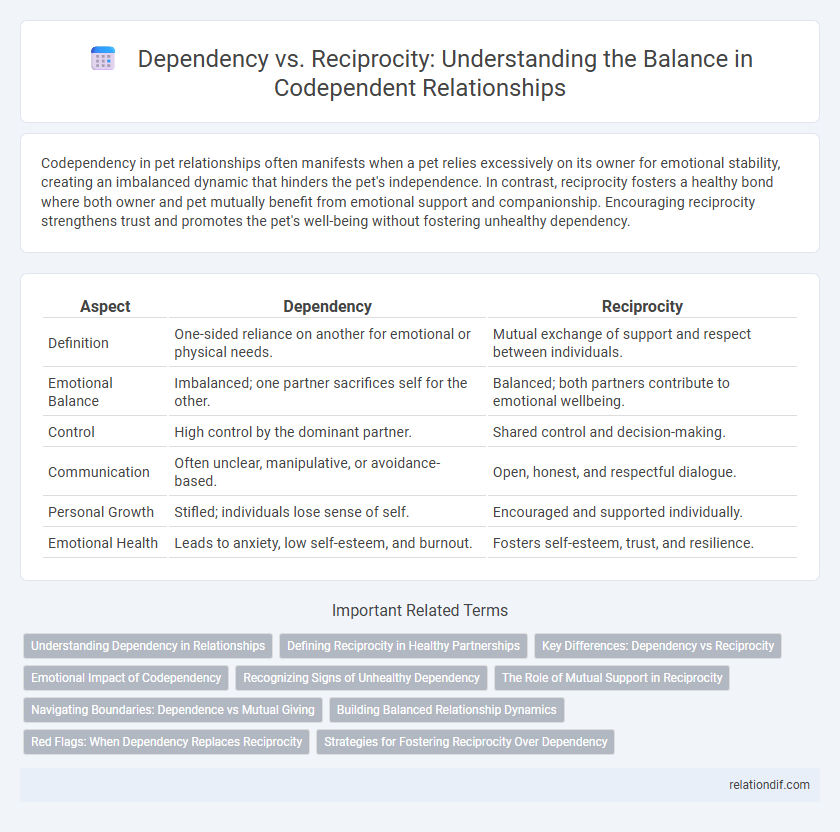Codependency in pet relationships often manifests when a pet relies excessively on its owner for emotional stability, creating an imbalanced dynamic that hinders the pet's independence. In contrast, reciprocity fosters a healthy bond where both owner and pet mutually benefit from emotional support and companionship. Encouraging reciprocity strengthens trust and promotes the pet's well-being without fostering unhealthy dependency.
Table of Comparison
| Aspect | Dependency | Reciprocity |
|---|---|---|
| Definition | One-sided reliance on another for emotional or physical needs. | Mutual exchange of support and respect between individuals. |
| Emotional Balance | Imbalanced; one partner sacrifices self for the other. | Balanced; both partners contribute to emotional wellbeing. |
| Control | High control by the dominant partner. | Shared control and decision-making. |
| Communication | Often unclear, manipulative, or avoidance-based. | Open, honest, and respectful dialogue. |
| Personal Growth | Stifled; individuals lose sense of self. | Encouraged and supported individually. |
| Emotional Health | Leads to anxiety, low self-esteem, and burnout. | Fosters self-esteem, trust, and resilience. |
Understanding Dependency in Relationships
Dependency in relationships often involves one partner relying excessively on the other for emotional support, validation, or decision-making, which can lead to imbalance and reduced personal autonomy. Reciprocity, by contrast, emphasizes mutual exchange and support, where both individuals contribute equally to the relationship's emotional and practical needs. Understanding dependency requires recognizing patterns where one partner's needs dominate, hindering healthy interdependence and fostering codependent dynamics.
Defining Reciprocity in Healthy Partnerships
Reciprocity in healthy partnerships involves mutual exchange of support, respect, and care that fosters balanced interdependence rather than one-sided reliance. Unlike dependency, which centers on excessive emotional or psychological reliance on another, reciprocity emphasizes shared responsibility and equal contribution to the relationship's well-being. This dynamic promotes growth, autonomy, and emotional resilience for both partners.
Key Differences: Dependency vs Reciprocity
Dependency involves one person relying excessively on another for emotional support, approval, or identity, often leading to an imbalanced relationship dynamic. Reciprocity, in contrast, is characterized by mutual give-and-take where both individuals support each other equitably, fostering healthy interdependence. Key differences include the presence of autonomy and respect in reciprocity, whereas dependency often entails control, neediness, and lack of boundaries.
Emotional Impact of Codependency
Codependency often blurs the line between healthy reciprocity and unhealthy dependency, leading to significant emotional turmoil. Individuals trapped in codependent relationships experience feelings of anxiety, low self-worth, and chronic guilt as their emotional needs become entangled with others' approval. This imbalance fosters emotional exhaustion and inhibits personal growth, perpetuating a harmful cycle that undermines mental well-being.
Recognizing Signs of Unhealthy Dependency
Unhealthy dependency often manifests through patterns of one-sided emotional reliance, where one person consistently sacrifices their own needs to satisfy the other. Unlike healthy reciprocity, which involves mutual support and balanced give-and-take, codependent relationships exhibit control, manipulation, or excessive caretaking. Key signs include feeling responsible for another's emotions, chronic low self-esteem, and difficulty setting personal boundaries.
The Role of Mutual Support in Reciprocity
Mutual support in reciprocity fosters balanced relationships where both individuals contribute and benefit equally, enhancing emotional well-being and personal growth. Unlike dependency, which often involves an imbalanced reliance that can hinder autonomy, reciprocity emphasizes shared responsibility and empowerment. This dynamic creates a foundation for healthy connections by promoting trust, respect, and reciprocal care.
Navigating Boundaries: Dependence vs Mutual Giving
Navigating boundaries in relationships requires distinguishing between dependency, where one party relies excessively on another, and reciprocity, characterized by mutual giving and balanced support. Healthy connections thrive on reciprocity, fostering emotional autonomy while encouraging interdependence without sacrificing individual needs. Establishing clear limits prevents codependency by promoting respect, personal responsibility, and equitable exchanges in emotional and practical support.
Building Balanced Relationship Dynamics
Dependency involves one-sided reliance where one person consistently sacrifices their needs, often leading to imbalance and control issues. Reciprocity fosters mutual support and respect, ensuring both partners contribute equally to the relationship's emotional and practical needs. Building balanced relationship dynamics requires clear communication, boundaries, and shared responsibility to nurture healthy interdependence rather than unhealthy dependency.
Red Flags: When Dependency Replaces Reciprocity
Codependency often blurs the line between healthy reciprocity and unhealthy dependency, where one person consistently sacrifices their needs to support another without mutual exchange. Red flags include imbalanced emotional labor, loss of personal boundaries, and a persistent pattern of enabling harmful behaviors under the guise of care. Recognizing these signs is crucial to breaking the cycle and fostering relationships grounded in genuine give-and-take.
Strategies for Fostering Reciprocity Over Dependency
Fostering reciprocity over dependency requires establishing clear boundaries that encourage mutual support rather than one-sided reliance. Strategies include promoting open communication to express needs and expectations while encouraging shared responsibility in relationships. Emphasizing self-awareness and personal growth helps individuals contribute equally, creating balanced, interdependent connections.
Dependency vs Reciprocity Infographic

 relationdif.com
relationdif.com